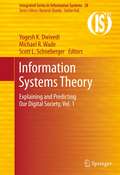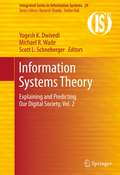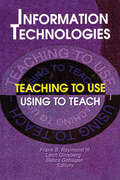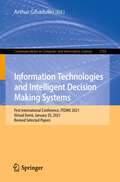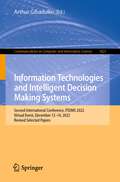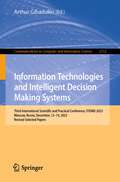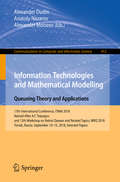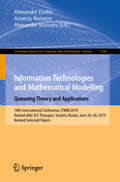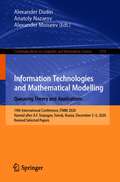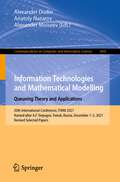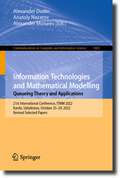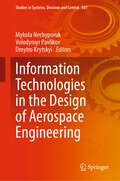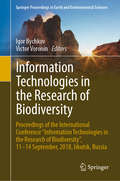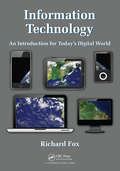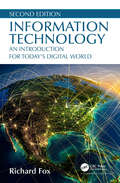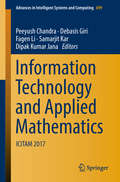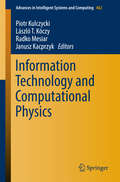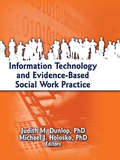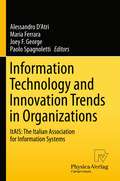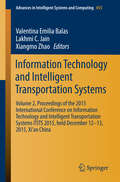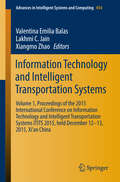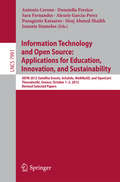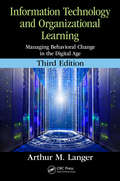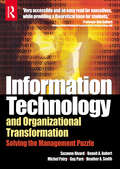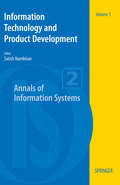- Table View
- List View
Information Systems Theory: Explaining and Predicting Our Digital Society, Vol. 1
by Scott L. Schneberger Yogesh K. Dwivedi Michael R. WadeThe overall mission of this book is to provide a comprehensive understanding and coverage of the various theories and models used in IS research. Specifically, it aims to focus on the following key objectives: To describe the various theories and models applicable to studying IS/IT management issues. To outline and describe, for each of the various theories and models, independent and dependent constructs, reference discipline/originating area, originating author(s), seminal articles, level of analysis (i.e. firm, individual, industry) and links with other theories. To provide a critical review/meta-analysis of IS/IT management articles that have used a particular theory/model.To discuss how a theory can be used to better understand how information systems can be effectively deployed in today's digital world. This book contributes to our understanding of a number of theories and models. The theoretical contribution of this book is that it analyzes and synthesizes the relevant literature in order to enhance knowledge of IS theories and models from various perspectives. To cater to the information needs of a diverse spectrum of readers, this book is structured into two volumes, with each volume further broken down into two sections. The first section of Volume 1 presents detailed descriptions of a set of theories centered around the IS lifecycle, including the Success Model, Technology Acceptance Model, User Resistance Theories, and four others. The second section of Volume 1 contains strategic and economic theories, including a Resource-Based View, Theory of Slack Resources, Portfolio Theory, Discrepancy Theory Models, and eleven others. The first section of Volume 2 concerns socio-psychological theories. These include Personal Construct Theory, Psychological Ownership, Transactive Memory, Language-Action Approach, and nine others. The second section of Volume 2 deals with methodological theories, including Critical Realism, Grounded Theory, Narrative Inquiry, Work System Method, and four others. Together, these theories provide a rich tapestry of knowledge around the use of theory in IS research. Since most of these theories are from contributing disciplines, they provide a window into the world of external thought leadership.
Information Systems Theory, Explaining and Predicting Our Digital Society, Vol. 2
by Yogesh K. Dwivedi Michael R. Wade Scott L. SchnebergerThe overall mission of this book is to provide a comprehensive understanding and coverage of the various theories and models used in IS research. Specifically, it aims to focus on the following key objectives: To describe the various theories and models applicable to studying IS/IT management issues. To outline and describe, for each of the various theories and models, independent and dependent constructs, reference discipline/originating area, originating author(s), seminal articles, level of analysis (i.e. firm, individual, industry) and links with other theories. To provide a critical review/meta-analysis of IS/IT management articles that have used a particular theory/model.To discuss how a theory can be used to better understand how information systems can be effectively deployed in today's digital world. This book contributes to our understanding of a number of theories and models. The theoretical contribution of this book is that it analyzes and synthesizes the relevant literature in order to enhance knowledge of IS theories and models from various perspectives. To cater to the information needs of a diverse spectrum of readers, this book is structured into two volumes, with each volume further broken down into two sections. The first section of Volume 1 presents detailed descriptions of a set of theories centered around the IS lifecycle, including the Success Model, Technology Acceptance Model, User Resistance Theories, and four others. The second section of Volume 1 contains strategic and economic theories, including a Resource-Based View, Theory of Slack Resources, Portfolio Theory, Discrepancy Theory Models, and eleven others. The first section of Volume 2 concerns socio-psychological theories. These include Personal Construct Theory, Psychological Ownership, Transactive Memory, Language-Action Approach, and nine others. The second section of Volume 2 deals with methodological theories, including Critical Realism, Grounded Theory, Narrative Inquiry, Work System Method, and four others. Together, these theories provide a rich tapestry of knowledge around the use of theory in IS research. Since most of these theories are from contributing disciplines, they provide a window into the world of external thought leadership.
Information Technologies: Teaching to Use—Using to Teach
by Frank B Raymond Iii Leon Ginsberg Debra GohaganThis insightful volume explores examples of the use of technology to teach social work knowledge, values, and skills across the curriculum. The chapters cover a wide range of perspectives, including international views of the role of information technology in Great Britain and Malaysia, training approaches for faculty development, and computer-based software that has the potential to transform the manner in which curriculum objectives are met. Prepare for technology-based instruction in social work education for the 21st century!Information Technologies: Teaching to Use--Using to Teach Information Technologies: Teaching to Use--Using to Teach, addresses your need to fully prepare today?s social work graduates to work and live in this rapidly changing, technology-enhanced environment. Based on the 1997 Information Technologies Conference: Using to Teach--Teaching to Use, held in Charleston, South Carolina, this book covers the multitude of topics that were presented on technology-based instruction as we head into the 21st century. Articles in Information Technologies range from the use of the Internet and computer applications to research projects that address the effectiveness of technology-based teaching and learning activities. It also dicusses international views on the role of information technology in Britian and Malaysia. Information Technologies gives particular attention to distance education, and it is the most thorough treatment to date of the use and teaching of technology in social work education. Specific areas you?ll gain valuable information from include:establishing a faculty development labstarting intensive faculty training sessionscomputer-based software that has the potential to transform the manner in which curriculum objectives are metinternational perspectives on information technologythe use of Geographic Information Systems technology in social work practice as a tool for improved visualization of social and economic inequalitiesmodels for teaching social work curriculum with technologyWith Information Technologies, you will gain a competetive edge in preparing your faculty and students with the latest world-wide information on studies pretaining to technology use in a social work setting. A conglomeration of diverse and well-researched articles on the use of technology to enhance social work education await you in this special volume.
Information Technologies and Intelligent Decision Making Systems: First International Conference, ITIDMS 2021, Virtual Event, January 25, 2021, Revised Selected Papers (Communications in Computer and Information Science #1703)
by Arthur GibadullinThis book constitutes selected papers presented at the First International Scientific and Practical Conference on Information Technologies and Intelligent Decision Making Systems, ITIDMS 2021, held as Virtual Event in January, 2021.The 13 presented papers were thoroughly reviewed and selected from the 41 submissions. The conference was held with the aim of summarizing international experience in the field of information, digital and intellectual development, within which proposals were formulated for digital and information transformation, the development of computer models, information technologies, automated and computing processes. A distinctive feature of the conference is that it presented reports of authors from China, Uzbekistan, Lebanon, Poland, Kazakhstan, Bulgaria and Russia. Researchers from different countries presented the process of transition of the information and digital path of development, presented the main directions and developments that can improve the efficiency and development.
Information Technologies and Intelligent Decision Making Systems: Second International Conference, ITIDMS 2022, Virtual Event, December 12–14, 2022, Revised Selected Papers (Communications in Computer and Information Science #1821)
by Arthur GibadullinThis book constitutes the proceedings of the Second International Conference on Information Technologies and Intelligent Decision Making Systems, ITIDMS 2022, held as a virtual event, December 12–14, 2022.The 14 papers presented in this volume were carefully reviewed and selected from 38 submissions. The conference was held with the aim of developing and exchanging international experience in the field of information, digital and intellectual technologies, within the framework of which proposals were formulated for digital, intellectual and infor-mation transformation, the development of computer models and the improvement of automated and computing processes. A distinctive feature of the conference is that it presented reports of authors from USA, Canada, Bangladesh, Uzbekistan and Russia. Researchers from different countries presented the process of transition of the information and digital path of development, presented the main directions and de-velopments that can improve the efficiency and development.
Information Technologies and Intelligent Decision Making Systems: Third International Scientific and Practical Conference, ITIDMS 2023, Moscow, Russia, December, 12-14, 2023, Revised Selected Papers (Communications in Computer and Information Science #2112)
by Arthur GibadullinThis book constitutes the refereed post proceedings of the Third International Scientific and Practical Conference on Information Technologies and Intelligent Decision Making Systems, ITIDMS 2023, held in Moscow, Russia, during December, 12-14, 2023. The 18 full papers included in this book were carefully reviewed and selected from 54 submissions. The papers presented in this volume focus on topics such as digital, intellectual and information transformation, the development of computer models and the improvement of automated and computing processes.
Information Technologies and Mathematical Modelling. Queueing Theory and Applications: 17th International Conference, ITMM 2018, Named After A.F. Terpugov, and 12th Workshop on Retrial Queues and Related Topics, WRQ 2018, Tomsk, Russia, September 10-15, 2018, Selected Papers (Communications in Computer and Information Science #912)
by Alexander Dudin Anatoly Nazarov Alexander MoiseevThis book constitutes the proceedings of the 17th International Conference on Information Technologies and Mathematical Modelling, ITMM 2018, named after A.F. Terpugov, and the 12th Workshop on Retrial Queues and Related Topics, held in Tomsk, Russia, in September 2018. The 30 papers presented in this volume were carefully reviewed and selected from 84 submissions. The conference covers various aspects of information technologies, focusing on queueing theory, stochastic processes, Markov processes, renewal theory, network performance equation and network protocols.
Information Technologies and Mathematical Modelling. Queueing Theory and Applications: 18th International Conference, ITMM 2019, Named after A.F. Terpugov, Saratov, Russia, June 26–30, 2019, Revised Selected Papers (Communications in Computer and Information Science #1109)
by Alexander Dudin Anatoly Nazarov Alexander MoiseevThis book constitutes the proceedings of the 18th International Conference on Information Technologies and Mathematical Modelling, ITMM 2019, named after A.F. Terpugov, held in Saratov, Russia, in June 2019. The 25 full papers presented in this volume were carefully reviewed and selected from 72 submissions. The conference covers various aspects of information technologies, focusing on queueing theory, stochastic processes, Markov processes, renewal theory, network performance equation and network protocols.
Information Technologies and Mathematical Modelling. Queueing Theory and Applications: 19th International Conference, ITMM 2020, Named after A.F. Terpugov, Tomsk, Russia, December 2-5, 2020, Revised Selected Papers (Communications in Computer and Information Science #1391)
by Alexander Dudin Anatoly Nazarov Alexander MoiseevThis book constitutes revised selected papers of the 19th International Conference on Information Technologies and Mathematical Modelling, ITMM 2020, named after A.F. Terpugov, held in Tomsk, Russia, in December 2020. The 31 full papers presented in this volume were carefully reviewed and selected from 82 submissions. The conference covers various aspects of information technologies, focusing on queueing theory, stochastic processes, Markov processes, renewal theory, network performance equation and network protocols.
Information Technologies and Mathematical Modelling. Queueing Theory and Applications: 20th International Conference, ITMM 2021, Named after A.F. Terpugov, Tomsk, Russia, December 1–5, 2021, Revised Selected Papers (Communications in Computer and Information Science #1605)
by Alexander Dudin Anatoly Nazarov Alexander MoiseevThis book constitutes revised selected papers of the 20th International Conference on Information Technologies and Mathematical Modelling, ITMM 2021, named after A.F. Terpugov, held in Tomsk, Russia, in December 2021. Due to the COVID-19 pandemic the conference was held in a virtual mode. The 28 full papers presented in this volume were carefully reviewed and selected from 89 submissions. The conference covers various aspects of information technologies, focusing on queueing theory, stochastic processes, Markov processes, renewal theory, network performance equation and network protocols.
Information Technologies and Mathematical Modelling. Queueing Theory and Applications: 21st International Conference, ITMM 2022, Karshi, Uzbekistan, October 25–29, 2022, Revised Selected Papers (Communications in Computer and Information Science #1803)
by Alexander Dudin Anatoly Nazarov Alexander MoiseevThis book constitutes the refereed proceedings of the 21st International Conference on Information Technologies and Mathematical Modelling. Queueing Theory and Applications, ITMM 2022, held in Karshi, Uzbekistan, during October 25–29, 2022. The 19 full papers included in this book were carefully reviewed and selected from 89 submissions. The papers are devoted to new results in queueing theory and its applications. Its target audience includes specialists in probabilistic theory, random processes, mathematical modeling as well as engineers engaged in logical and technical design and operational management of data processing systems, communication, and computer networks.
Information Technologies in the Design of Aerospace Engineering (Studies in Systems, Decision and Control #507)
by Mykola Nechyporuk Volodymyr Pavlikov Dmytro KrytskyiThis book proposes a solution to the problem of incorrect use of automation tools to perform complex design work. Currently, a large number of start-up projects are non-professional design bureaus that show a huge amount of their achievements. In reality, most of these achievements burst like soap bubbles. This is due to the low-quality and inefficient use of information technology in this industry. The book highlights advanced information technologies in the fields of design, machine learning, and computer vision.
Information Technologies in the Research of Biodiversity: Proceedings of the International Conference "Information Technologies in the Research of Biodiversity", 11–14 September, 2018, Irkutsk, Russia (Springer Proceedings in Earth and Environmental Sciences)
by Igor Bychkov Victor VoroninThis book offers a collection of papers presented at the First International Conference” Information Technologies in the Research of Biodiversity” that was held from 11-14 September 2018 in Irkutsk (Russia). Papers in this book cover areas of interaction of knowledge on biodiversity and information technologies. The main topics include: methods, models, software systems for the analysis of biodiversity data; global data portals; information and analytical systems on biodiversity; application of remote methods in vegetation mapping; theoretical fundaments and organization technologies of the information and telecommunications infrastructures.
Information Technology: An Introduction for Today's Digital World
by Richard FoxInformation Technology: An Introduction for Today's Digital World introduces undergraduate students to a wide variety of concepts they will encounter throughout their IT studies and careers. The book covers computer organization and hardware, Windows and Linux operating systems, system administration duties, scripting, computer networks, regular ex
Information Technology: An Introduction for Today’s Digital World
by Richard FoxThis revised edition has more breadth and depth of coverage than the first edition. Information Technology: An Introduction for Today&’s Digital World introduces undergraduate students to a wide variety of concepts they will encounter throughout their IT studies and careers. Features: Provides introductory system administration coverage of Windows 10 and Linux (Red Hat 7) as both general concepts and with specific hands-on instruction Includes coverage of programming and shell scripting, demonstrated through example code in several popular languages Presents Updated information on modern IT careers Covers computer networks including more content on cloud computing Contains more coverage of computer security (the original&’s coverage is largely limited to just one part of one chapter) Ancillary material which includes a lab manual for hands-on exercises Suitable for any introductory IT course, this classroom-tested text presents many of the topics recommended by the ACM Special Interest Group on IT Education (SIGITE). It offers a far more detailed examination of the computer and the IT field than computer literacy texts, focusing on concepts essential to all IT professionals—from system administration to scripting to computer organization. Four chapters are dedicated to the Windows and Linux operating systems so that students can gain hands-on experience with operating systems that they will deal with.
Information Technology and Applied Mathematics: Icitam 2017 (Advances In Intelligent Systems And Computing #699)
by Dipak Kumar Jana Samarjit Kar Fagen Li Debasis Giri Peeyush ChandraThis book discusses recent advances and contemporary research in the field of cryptography, security, mathematics and statistics, and their applications in computing and information technology. Mainly focusing on mathematics and applications of mathematics in computer science and information technology, it includes contributions from eminent international scientists, researchers, and scholars. The book helps researchers update their knowledge of cryptography, security, algebra, frame theory, optimizations, stochastic processes, compressive sensing, functional analysis, and complex variables.
Information Technology and Computational Physics
by Piotr Kulczycki László T. Kóczy Radko Mesiar Janusz KacprzykA broad spectrum of modern Information Technology (IT) tools, techniques, main developments and still open challenges is presented. Emphasis is on new research directions in various fields of science and technology that are related to data analysis, data mining, knowledge discovery, information retrieval, clustering and classification, decision making and decision support, control, computational mathematics and physics, to name a few. Applications in many relevant fields are presented, notably in telecommunication, social networks, recommender systems, fault detection, robotics, image analysis and recognition, electronics, etc. The methods used by the authors range from high level formal mathematical tools and techniques, through algorithmic and computational tools, to modern metaheuristics.
Information Technology and Evidence-Based Social Work Practice
by Michael J. Holosko Judith M. DunlopLearn to use the latest technological advances in evidence-based social workSocial work practice can be positively or negatively impacted by the advance of technology. Advances and applications must be up-to-date as possible, yet they may be ineffective if not simple enough to easily learn and use. Information Technology and Evidence-Based Social Work presents leading social work experts exploring the latest technological advances and the innovative practical applications which can be used effectively in evidence-based social work. Students and practitioners get creative practical advice on how best understand technology and apply it to their work.Information Technology and Evidence-Based Social Work is divided into four sections. The first section provides the context for understanding the technological link between social work and evidence-based practice. The second section presents examples of how information technology can be used to effectively teach students and practitioners in the field. Section three explores ways to implement technology for use by clients. The fourth section summarizes and then takes a look at the future of technology in evidence-based social work. Chapters include questions for practitioners and for clients to illuminate the current and future issues surrounding technology and evidence-based practice. The text also includes extensive references, and useful tables and figures.Topics in Information Technology and Evidence-Based Social Work include: the impact of technology on social work computer-assisted evidence-based practice customized web-based technology and its use in clinical supervision enhanced technology-based evidence-based practice model and its applicability to large human service organizations. using information technology to provide evidence for planning and evaluating programs using technology in advocacy the geographic information system (GIS) as a useful tool in all aspects of programs and policies evaluating practice through information technology the development and evaluation of an online social work service psychotherapeutic group intervention for family caregivers over the Internet support group online chat a case study of how Internet chat group technology can be implemented with cancer survivors technology as a service learning mechanism for promoting positive youth development in a community-based setting a model which can be used to collect information and—by using best evidence available—arrive at a confident decision and more! Information Technology and Evidence-Based Social Work is timely, stimulating reading for educators, undergraduate students, graduate students, and practitioners in the fields of social work, psychology, and public administration.
Information Technology and Innovation Trends in Organizations
by Paolo Spagnoletti Joey F. George Maria Ferrara Alessandro D'AtriThe book examines a wide range of issues that characterize the current IT based innovation trends in organisations. It contains a collection of research papers focusing on themes of growing interest in the field of Information System, Organization Studies, and Management. The book offers a multi-disciplinary view on Information Systems aiming to disseminate academic knowledge. It might be particularly relevant to IT practitioners such as information systems managers, business managers and IT consultants. The volume is divided into XIV sections, each one focusing on a specific theme. A preface written by Joey George, president of the Association for Information Systems opens the text. The content of each section is based on a selection of the best papers (original double blind peer reviewed contributions) presented at the annual conference of the Italian chapter of AIS, which has been held in Naples, Italy, on October 2010.
Information Technology and Intelligent Transportation Systems
by Valentina Emilia Balas Lakhmi C. Jain Xiangmo ZhaoThis volume includes the proceedings of the 2015 International Conference on Information Technology and Intelligent Transportation Systems (ITITS 2015) which was held in Xi'an on December 12-13, 2015. The conference provided a platform for all professionals and researchers from industry and academia to present and discuss recent advances in the field of Information Technology and Intelligent Transportation Systems. The presented information technologies are connected to intelligent transportation systems including wireless communication, computational technologies, floating car data/floating cellular data, sensing technologies, and video vehicle detection. The articles focusing on intelligent transport systems vary in the technologies applied, from basic management systems to more application systems including topics such as emergency vehicle notification systems, automatic road enforcement, collision avoidance systems and some cooperative systems. The conference hosted 12 invited speakers and over 200 participants. Each paper was under double peer reviewed by at least 3 reviewers. This proceedings are sponsored by Shaanxi Computer Society and co-sponsored by Chang'an University, Xi'an University of Technology, Northwestern Poly-technical University, CAS, Shaanxi Sirui Industries Co. , LTD.
Information Technology and Intelligent Transportation Systems
by Valentina Emilia Balas Lakhmi C. Jain Xiangmo ZhaoThis volume includes the proceedings of the 2015 International Conference on Information Technology and Intelligent Transportation Systems (ITITS 2015) which was held in Xi'an on December 12-13, 2015. The conference provided a platform for all professionals and researchers from industry and academia to present and discuss recent advances in the field of Information Technology and Intelligent Transportation Systems. The presented information technologies are connected to intelligent transportation systems including wireless communication, computational technologies, floating car data/floating cellular data, sensing technologies, and video vehicle detection. The articles focusing on intelligent transport systems vary in the technologies applied, from basic management systems to more application systems including topics such as emergency vehicle notification systems, automatic road enforcement, collision avoidance systems and some cooperative systems. The conference hosted 12 invited speakers and over 200 participants. Each paper was under double peer reviewed by at least 3 reviewers. This proceedings are sponsored by Shaanxi Computer Society and co-sponsored by Chang'an University, Xi'an University of Technology, Northwestern Poly-technical University, CAS, Shaanxi Sirui Industries Co. , LTD.
Information Technology and Open Source: Applications for Education, Innovation, and Sustainability
by Antonio Cerone Donatella Persico Sara Fernandes Alexeis Garcia-Perez Panagiotis Katsaros Siraj Ahmed Shaikh Ioannis StamelosThis book constitutes revised selected papers from the following SEFM 2012 satellite events: InSuEdu, the First International Symposium on Innovation and Sustainability in Education; MokMaSD, the First International Symposium on Modelling and Knowledge Management for Sustainable Development and Open Cert, the 6th International Workshop on Foundations and Techniques for Open Source Software Certification, held in Thessaloniki, Greece, in October 2012. The total of 14 regular papers and 7 short papers included in this volume were carefully reviewed and selected from 35 submissions. The papers cover the topics related to the use of Information and Communication Technology (ICT) and Open Source Software (OSS) as tools to foster and support Education, Innovation and Sustainability.
Information Technology and Organizational Learning: Managing Behavioral Change in the Digital Age
by Arthur M. LangerFocusing on the critical role IT plays in organizational development, the book shows how to employ action learning to improve the competitiveness of an organization. Defining the current IT problem from an operational and strategic perspective, it presents a collection of case studies that illustrate key learning issues. It details a dynamic model for effective IT management through adaptive learning techniques—supplying proven educational theories and practices to foster the required changes in your staff. It examines existing organizational learning theories and the historical problems that occurred with companies that have used them, as well as those that have failed to use them.
Information Technology and Organizational Transformation: Solving The Management Puzzle
by Heather Smith Suzanne Rivard Benoit Aubert Michel Patry Guy PareThis text is designed to help managers who have to deal with a complex environment, and who are often presented with "ready-made" solutions as to how to best organize their firm, to best use information technology. The book presents a simple and attractive framework within which managers can analyze their firm's environment and characteristics, and reflect on the most appropriate way - for them - to "put the puzzle together." It provides the manager and student with an integrated conceptual but pragmatic framework to analyze their situation. Courses examining the role of Information Technology in emerging organizational forms will find a well-grounded conceptual framework, illustrated with in-depth case studies. The book draws from the latest research in industrial organization, strategy, information technology, organizational theory, and leadership. It examines the individual puzzle pieces that have to be put together - strategy, structure, information technology, and leadership, and present the cases of three firms that were equally successful in putting these pieces together, while choosing pieces with dramatically different forms and adjusting them in radically different ways.The three in-depth cases included in the book are international:Oticon is a Danish firm with close to 1500 employees and is a world leader in the manufacture of hearing aids. Li & Fung is another, fist established in Canton and is an international trading company.Progressive Insurance which is the third largest insurance company in the US.
Information Technology and Product Development
by Satish NambisanInformation Technology and Product Development: A Research Agenda presents important new research from varied disciplines aimed at developing new theoretical concepts and insights on the application of IT in product and service innovation. Drawing on the work of researchers in such varied management areas as information services, technology management, marketing, operations, business strategy and organizational behavior, the book redefines the role of IT in product and service development and the organizational and management issues underlying the successful deployment of IT in innovation contexts, and provides a foundation for future research on the diverse types of IT applications in product development and their potential impact on both product and service innovation. Reflecting two critical shifts in the service sector - the increased complexity and convergence in products and services, along with the rise of the Internet and rapid digitization of products and services - the book is organized into three sections. Section 1 presents four chapters that focus on the traditional areas of project and process management; Section 2 presents four chapters focusing on the emerging areas of collaborative innovation and knowledge co-creation; and Section 3 presents one chapter that draws it all together and identifies some of the important themes and issues for future research. This important new work has much to offer academic researchers in management in its in-depth theoretical analysis of the wide range of organizational and management issues associated with the application of IT in product and service development. It will also appeal to researchers and thought-leaders in consulting organizations whose primary area of interest is product development or IT applications.
